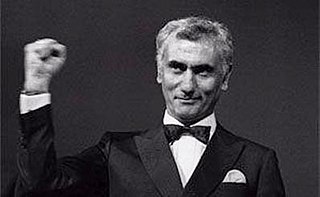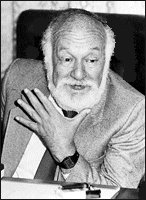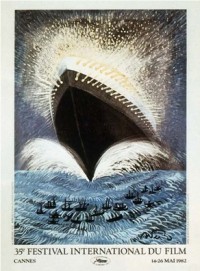Related Research Articles

Yılmaz Güney 1 April 1937 – 9 September 1984) was a Kurdish film director, screenwriter, novelist, actor and communist political activist. He quickly rose to prominence in the Turkish film industry. Many of his works were made from a far-left perspective and devoted to the plight of working-class people in Turkey. Güney won the Palme d'Or at the Cannes Film Festival in 1982 for the film Yol which he co-produced with Şerif Gören. He was at constant odds with the Turkish government over the portrayal of Kurdish culture, people and language.

Cinema of Turkey or Turkish cinema, or Türksineması refers to the Turkish film art and industry. It is an important part of Turkish culture, and has flourished over the years, delivering entertainment to audiences in Turkey, Turkish expatriates across Europe, Balkans & Eastern Europe, also more recently prospering in the Arab world besides the Egyptian cinema and to a lesser extent, the rest of the world.
Kamile Suat Ebrem, better known as Müjde Ar, is a Turkish film actress.

Yol is a 1982 Turkish film directed by Yılmaz Güney and Şerif Gören. The screenplay was written by Güney, and directed by his assistant Gören, as Güney was in prison at the time. Later, after Güney escaped from Imrali prison, he took the negatives of the film to Switzerland and later edited it in Paris.

Ömer Zülfü Livanelioğlu is a Turkish musician, author, poet, and politician.
Kurdish cinema focuses on the Kurdish people and culture. The fate of the Kurds as a people without a state shaped their cinema. Kurdish films often show social grievances, oppression, torture, human rights violations, and life as a stranger. Kurdish cinema has a high significance for the Kurds, as it offers the opportunity to draw attention to their own situation artistically. However, because of state repression, most films are produced in exile. The best example of this is in Turkey, where Kurds were not permitted to speak their native language until 1991, which made the development of their films more difficult.
Atıf Yılmaz Batıbeki was a renowned Turkish film director, screenwriter, and film producer. He was very much a legend in the film industry of Turkey with 119 movies directed. He also wrote screenplays for 53 movies and produced 28 movies from 1951 right up till his death in 2006. He was active in almost every period of the Turkish film industry.

Halit Refiğ was a Turkish film director, film producer, screenwriter and writer. He made around sixty films, including feature films, documentaries and TV serials. He is considered to be the pioneer of the National Cinema movement and the initiator of the production of TV serials in Turkey.

Tunç Başaran was a Turkish screenwriter, film director, film producer and actor.

Türkan Şoray is a Turkish actress, writer and film director. She is known as "Sultan" of the Cinema of Turkey. She started her career in 1960, and won her first award as the most successful actress at the 1st Antalya Golden Orange Film Festival for the movie Acı Hayat. Having appeared in more than 222 films, Şoray has starred in the most feature films for a female actress worldwide. On 12 March 2010, Şoray was chosen as a UNICEF goodwill ambassador in Turkey, about which she said: "I think there is nothing that cannot be done with love. If we combine power with love, we can overcome many problems".
Salih Güney is a Turkish film actor.
Tuncel Tayanç Kurtiz was a Turkish theatre, movie and TV series actor, playwright, and film director. Since 1964, he acted in more than 70 movies, including many international productions.

Osman Fahir Seden, usually credited as Osman F. Seden, was a Turkish film director, screenwriter and film producer.

The 35th Cannes Film Festival took place from 14 to 26 May 1982. Italian opera and theatre director Giorgio Strehler served as jury president for the main competition.
Zeki Ökten was a Turkish film director.

Hilal Nebahat Çehre is a Turkish actress, model, singer and beauty pageant titleholder who was crowned Miss Turkey 1960. She is best known for her protagonist roles as Firdevs Yöreoğlu on the Kanal D drama series Aşk-ı Memnu (2008–10) and as Hafsa Sultan on the series Muhteşem Yüzyıl (2011–12).

Halil İbrahim Ergün, better known as Halil Ergün, is a Turkish stage, movie, and television series actor.

Banu Alkan is a Turkish-Croatian actress. She moved to Edremit, Balıkesir, Turkey in 1966 when she was eight years old. She is described as an "80s pop culture icon of Turkey". Her first film appearance was in the 1976 film Taksi Şoförü directed by Şerif Gören.
Zeynep Kuray is a Turkish journalist. As of 2015, she wrote for BirGün and the Firat News Agency (ANF). She was kept under arrest between December 2011 and April 2013 as a part of the KCK investigation and is a recipient of the John Aubuchon Award for Press Freedom.

Matthias Drawe is a German filmmaker, writer, actor and journalist.
References
- ↑ Özgür Politika, Turkish-language Kurdish daily formerly published in Germany 9 September 2004
- 1 2 madebycat.com. "Şerif Gören". İKSV. Retrieved 1 August 2019.
- ↑ Usta yönetmen Şerif Gören hayatını kaybetti (in Turkish)